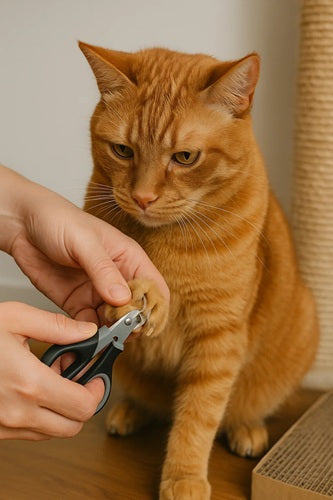Essential Tips For First-Time Cat Owners
Being a first-time cat owner can be very challenging, especially if you don’t know the first thing about being a pet parent. The main thing to remember is that before you get a cat, do a thorough research, be sure about it, and the rest will flow along naturally. In this blog, we’ll help you by giving you some helpful tips that can make the process easier for you -
Understanding Your Cat
Each cat is peculiar in their own way. They have their own tastes, styles, sleeping patterns, etc. It’s important to understand your cat, their likes and dislikes, and about their qualities, and feelings to really cater to their needs. It is possible your cat may or may not like certain foods or toys, and it is your job to be mindful about that.
However, understanding your cat goes deeper than just learning their likes and dislikes. You need to learn their moods, understand what makes them sad, happy, anxious, fearful or frustrated.
Purchasing Essential Supplies
When you get a cat for the first time, there are a few vital items that you need to get. Some of them include -
Bonding With Your Cat
Building trust takes time, especially with shy and skittish cats, therefore it is always important to bond with them if you want their trust. You can bond during play time, while feeding(especially hand-feeding), by cuddling them or scratching their head or chin, and also during grooming(for some cats).
It creates the trust between you and your cat, and trust is always the foundation of any relationship. When you bond with your cat, it strengthens your connection each time and your cat realizes he/she can rely on you.
Finding the Right Vet
When you visit a vet with your cat, it is essential that your cat trusts that vet otherwise they will be jumpy and resistant during every visit. The vet must know to handle your cat in such a way that they keep calm and allow the vet to examine them.
It is important because once you get a vet, it is recommended to stick with that vet since he is aware of your cat’s history. After a few visits, your vet would be familiar with your cat, he would know what to administer and how much. He would know what vaccines and medicines are appropriate for your cat, and what vaccines are already given. He would be in tune with your cat and know everything about them such as any allergies or medical conditions, etc.
Provide Proper Coat-Care
One of the most common coat issues cats are faced with is flea infestations. It is easily avoided with regular care and year-round protection from fleas and ticks. If, in case, your cat is infested with such pests, getting rid of them is quite a process, but can be done at home.
You can use special flea or tick shampoos, medicines made for your pet’s coat to eliminate fleas and flea eggs and there are even flea combs available to make the flea-removal process easier.
Cat-Proof Your Home
A new cat, unfamiliar with their environment, can cause damage to themselves or their surroundings, by tripping over something or banging into something. To prevent such things, it is recommended that you cat-proof your home. It means keeping everything hazardous out of your cat’s vicinity.
Some ways you can do that are:
-
Hide electrical cords and breakable items
-
Secure your furniture
-
Close toilet lids
-
Keep human food away from their reach
-
Block access to any appliances
-
Be sure to pick up any small items that can be swallowed
-
Remove toxic plants if you have any
We know it must be overwhelming having to learn new things, especially about a pet but the excitement of getting a cat will overpower any negative vibes. After the initial adjustment period, all that’s left is to have lots of fun with your fur-baby and shower them with love and cuddles.
Although being a cat parent is a responsibility, the upside about having a cat is that they are fairly independent and do not require as much maintenance as they get older. As time goes by, you’ll learn all there is to know about a cat and enjoy the companionship they provide.

















